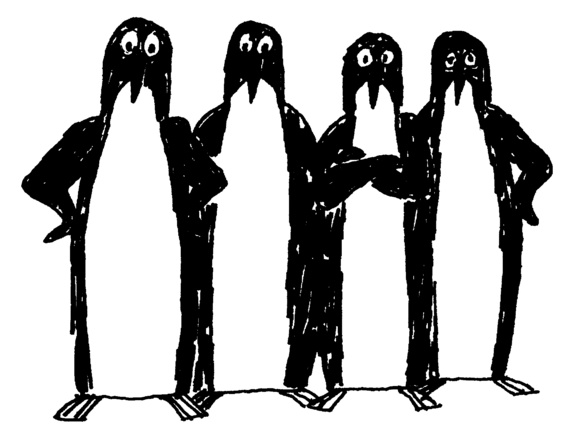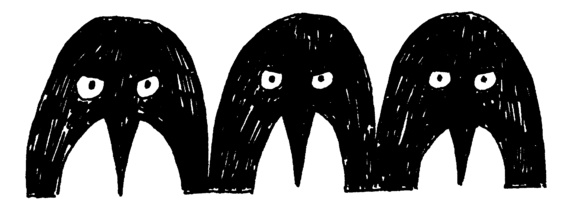I am a former Los Angeles Times manager who was pushed out of the company some 20 years ago. When it happened, I was so hurt, disappointed, and upset that I wrote a book about my experience as a woman working in the stuffy, bureaucratic, good-ole-boy newspaper business: A Peacock in the Land of Penguins: A Fable About Creativity and Courage. (Now published in 23 languages.)
When I learned of Jill Abramson's recent firing from the New York Times, it felt like my own story all over again. Jill went through the same thing at the New York Times that I had gone through at the LA Times. Where I had been a Peacock in the Land of Penguins, Jill was a Hawk in the Land of Penguins. Apparently, the more things change in the newspaper business, the more they stay the same. Here's Jill's story:
HELEN THE HAWK IN THE LAND OF PENGUINS
There once was a time,
in the not so distant past,
when penguins ruled many lands
in the Sea of Organizations.
They were not always wise,
They were not always popular,
But they were always in charge.
Most organizations looked the same:
Top executives and managers
wore their distinctive penguin suits,
while worker birds of many kinds
wore colors and outfits
that reflected their work
and their lifestyles.
Birds who aspired to move up
in their organizations
were encouraged to become
as penguin-like as possible ...
to shorten their steps
and learn the penguin stride,
to wear penguin suits,
and follow the example of their leaders.
Employee Development Departments offered
extensive training programs
on appropriate penguin-like behavior.
The rules and norms
were clear from Day One.
Penguins advised in subtle (and not so subtle) ways:
"This is the way we do things here.
If you want to be successful,
be like us."
Some of the birds
who wanted to move up in the pecking order
became very good at taking on the penguin look
and penguin behaviors.
They walked the penguin walk;
they talked the penguin talk.
They preened and practiced
to produce the desired result.
But somehow
they still never quite made it
into key positions.
It was assumed by all
that penguins were natural leaders -
orderly, loyal, and "good team players."
Penguins could be trusted
to put the organization's interests
ahead of personal and family concerns.
Other birds were thought to be
more flighty and less dependable.
Of course,
this was never stated out loud
or in writing.
Because, like every organization,
penguins wanted to be seen
as fair-minded and ready to promote
on the basis of talent,
hard work,
and contribution.
But everyone really knew...
The penguins had always been in charge,
and the penguins would always be in charge.
The elder penguins
would take younger penguins
under their wings
and coach them on how to be successful.
They would invite them
to play golf and go jogging.
They would sit together
in the executive dining room
and talk about sports.
It was clear to everyone
who the Very Important Penguins (VIPs) were.
It was also clear that the penguins
felt most comfortable around each other.
The other birds in the organization
knew how to act
to make the penguins
feel comfortable and secure.
And life was harmonious
in the Land of Penguins,
just as long as everyone played
by the penguins' rules.
Given the frigid, rigid corporate culture,
it was only a matter of time
before Helen the Hawk
would run into problems.
She was an intelligent, powerful bird -
savvy, sharp, and aggressive.
She was a skilled hunter,
with fierce investigative instincts.
She wore her penguin suit,
occasionally more colorful than the penguins,
but still acceptable.
Over the years, Helen had tried to adapt
to the style of the penguins,
but sooner or later,
her hawk nature would always reveal itself.
Her talons were sharp,
her eyes piercing,
her manner intense,
and her hunter's instincts ever alert.
Helen's assertive style
made the penguins uncomfortable.
And the higher she moved
in the pecking order,
the more the elders pressured her
to talk, act, and think
more like a penguin.
"Look, we like your work,"
the penguins said,
"but some of the elders
are uncomfortable with your style.
You need to change
to be accepted here.
Why can't you be more like us?"
"What's wrong with the way I am?"
asked Helen.
"I work hard; I produce great results.
Aren't my accomplishments
more important than my style?"
"You are smart and talented,"
the penguins replied.
"You could have a bright future here.
You just need to act more like us."
Helen was hurt, disappointed, and confused.
"Why can't I just be who I am?"
she asked.
"Why do I have to change to be accepted by you?"
"It's just the way things are,"
the penguins shrugged.
"It's the same everywhere in the Sea of Organizations."
The penguins had always said,
"We value diversity."
But their actions said otherwise.
BJ Gallagher is a diversity consultant and coauthor of 30 books, including a best-seller about the newspaper business, "A Peacock in the Land of Penguins: A Fable About Creativity and Courage" (Berrett-Koehler), now published in 23 languages worldwide, with over 375,000 copies sold.


